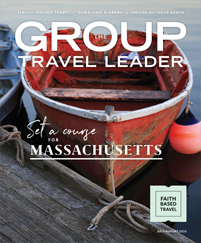Is the travel industry sitting on a largely untapped mental health remedy? Patrick Marsden thinks so.
Marsden, a sales director for global promotional products company MaCher, is a millennial. And he is concerned about the emerging mental health crisis he sees among people his age.
“We are 25 percent more likely to be depressed than the baby boomer generation,” he told the United States Tour Operators Association during a talk at its annual conference in December. “One in four of us has been diagnosed with a mental illness that has been treated in the last year. And the average high school student in the U.S. has the same levels of anxiety as the average psychiatric patient in the 1950s. That is horrifying.”
Experts attribute this increase in depression and anxiety to numerous causes, among them economic instability, mounting debt burdens and pressure to excel in school, sports, work and other endeavors. But nearly all recent research suggests the biggest factor might be our recently developed dependence on constant digital connectivity.
“Cellphones may be the cigarettes of our generation,” Marsden said. “Fifty percent of us are addicted to our phones, and 80 percent check them first thing in the morning.”
Part and parcel of the problem is the millennial generation’s love of social media — and Instagram in particular — which can cause members to check their phones for updates as often as 200 times per day. And the images and updates they see there are likely to cause social anxiety and feelings of inferiority as they compare their friends’ carefully curated posts with the messy realities of their own lives.
As concerning as the problem is, though, Marsden believes travel could be part of the solution.
“This is where we as an industry step in,” he said. “Our product has been proven to make our passengers feel better. That’s a well-researched and proven fact. Travel has a positive influence on mental health.”
Among the most interesting pieces of research he cited was a recent study in which the members of a small group on a trip to Morocco were asked to give up their phones for the last four days of the trip. Almost immediately, researchers noticed the participants’ posture improved, as did their conversations. They began to remember small interpersonal details about one another, details that are crucial in helping people bond and form social capital. They slept better, too.
Perhaps most importantly, though, the travelers reported making significant decisions about their relationships, careers and other major aspects of their lives, decisions they implemented after returning home.
There’s a lot we can take away from this. You may not have many millennials on your trips, but older generations have plenty of mental health challenges, too, although social stigmas keep many people from discussing them openly. And as people age, they are more likely to feel lonely and isolated.
When you bring people on trips, you’re bringing them into a traveling community that can relieve that loneliness. When you help them disconnect from technology, you give them opportunities to reconnect with themselves in a deeper way.
Travel isn’t just about seeing the sights. It’s about discovering — or rediscovering — the joy of living. Life is full of hardships, but a great trip can go a long way toward replacing anxiety with joy.











